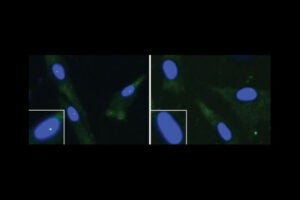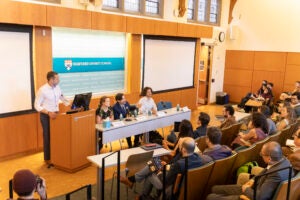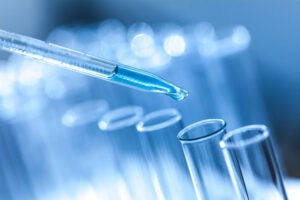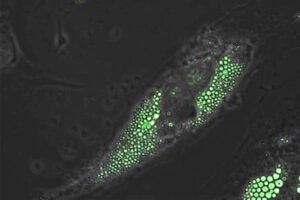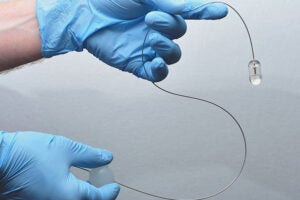Tag: National Institutes of Health
-
Nation & World
Researchers identify signaling molecule that may help prevent Alzheimer’s
New research in humans and mice identifies a particular signaling molecule that can help modify inflammation and the immune system to protect against Alzheimer’s disease.
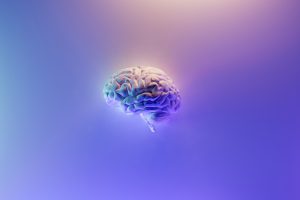
-
Nation & World
New gene-editing technique shows promise against sickle cell disease
Scientists at Harvard and the Broad Institute have demonstrated that it is possible to treat sickle cell disease in mice using a new gene-editing technique.
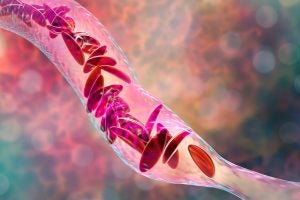
-
Nation & World
Innovative tool offers hope for children with rapid-aging disease
Several hundred children worldwide live with progeria, a deadly premature aging disease.
-
Nation & World
Harvard Chan School, Apple, and NIH launch women’s health study
Harvard Chan School, Apple, and NIH have officially launched a groundbreaking study that has potential to become the largest-ever study of women’s health.

-
Nation & World
Promising projects
Sixteen Harvard scientists are among the 93 researchers who have been selected to receive grants through the National Institutes of Health’s High-Risk, High-Reward program, which funds innovative research designed to address major challenges in biomedical science.

-
Nation & World
Fears arise that new federal fetal-tissue restrictions will hobble a ‘workhorse’ of research
With the Trump administration halting fetal tissue research at two prominent scientific institutions and new plans to review such research elsewhere, Harvard Medical School Dean George Daley discussed the importance of research using these tissues, which would otherwise be discarded, in creating vaccines and treatments and enhancing our understanding of human biology.
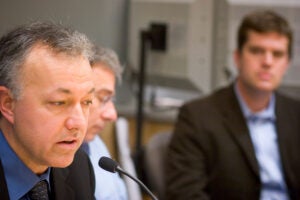
-
Nation & World
From federal support, groundbreaking research
Latest federal budget allocations allow Harvard scientists to push toward fresh discoveries.
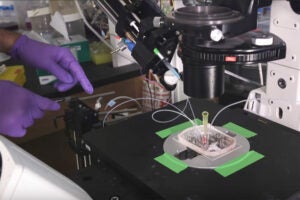
-
Nation & World
Harvard professor among 3 to receive up to $70M for Alzheimer’s research
A Harvard professor is among those slated to receive $70 million in NIH funding over five years to launch the Alzheimer’s Clinical Trials Consortium, which will accelerate and expand the disease’s therapeutic research.
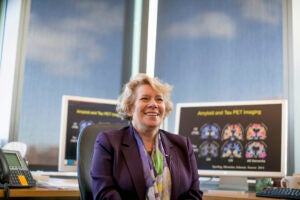
-
Nation & World
NIH makes $8.5M investment in promising projects
Eight Harvard scientists will receive nearly $8.5 million in funding through the National Institutes of Health’s High Risk, High Reward program to support research.
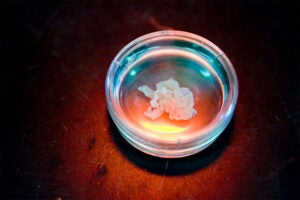
-
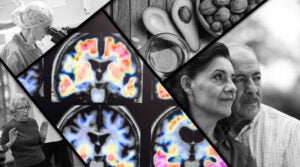
-
Nation & World
The changes in drug research, testing
In December, Congress passed a bipartisan law to boost federal medical research spending and to ease the approval of new drugs. In a panel discussion, experts at the Harvard T.H. Chan School of Public Health talked about its pros and cons, including whether it will be funded, and whether the relaxed drug approval guidelines are…
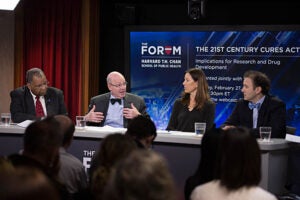
-
Nation & World
Tackling blood diseases, immune disorders
Startup Magenta Therapeutics licenses technologies from Harvard, Massachusetts General Hospital, and Boston Children’s Hospital that could help transform treatment.
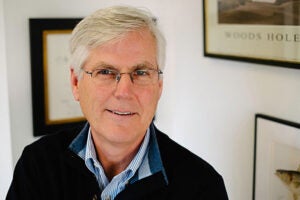
-
Nation & World
How the brain develops
In an effort to get a clearer picture of how the brain and the connections between its regions change throughout development, Harvard scientists and researchers from three other universities will share a $14 million grant to support one of the most comprehensive brain-imaging studies ever undertaken.
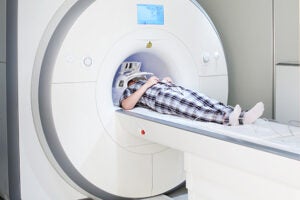
-
Nation & World
Funding for projects with promise
Four scientists from across Harvard will receive nearly $8 million in grant funding through the National Institutes of Health’s High Risk-High Reward program to support research into a variety of biomedical questions, ranging from how the bacterial cell wall is constructed to how the blood-brain barrier works.

-
Nation & World
A boost for understanding the brain
Two groups of Harvard scientists will be among the first researchers nationwide to receive grant funding through the BRAIN (Brain Research through Advancing Innovative Neurotechnologies) Initiative launched last year by President Obama.
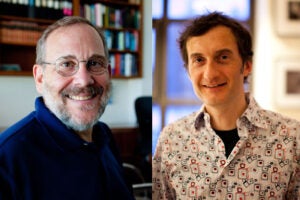
-
Nation & World
Medical School receives $30M in grant funding
The Harvard Program in Therapeutic Science has received $30 million in grant funding over the five years from three U.S. government agencies to launch its new research activities, Harvard Medical School announced on Sept. 11.
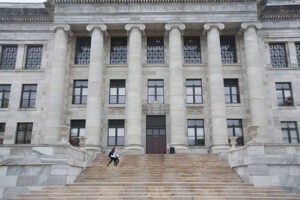
-
Nation & World
Genetic link between fried foods and obesity?
Harvard researchers have released the first study to show that the adverse effects of fried foods may vary depending on the genetic makeup of the individual.

-
Nation & World
Environment counts, Alzheimer’s research suggests
A new study led by Harvard Medical School Professor Dennis Selkoe provides specific, pre-clinical scientific evidence supporting the concept that prolonged and intensive stimulation by an enriched environment may have beneficial effects in delaying one of the key negative factors in Alzheimer’s disease.
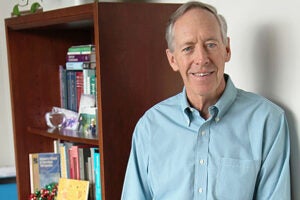
-
Nation & World
New avenue in neurobiology
Harvard stem cell biologists have proven that it is possible to turn one type of already differentiated neuron into another inside the brain, and their findings may have enormous implications for the treatment of neurodegenerative diseases.
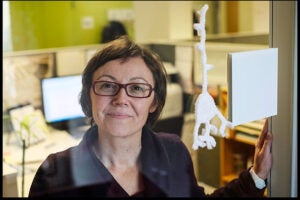
-
Nation & World
Birth of new cardiac cells
In a study from Harvard-affiliated Brigham and Women’s Hospital, researchers used a novel method to identify the new heart cells and describe their origins.
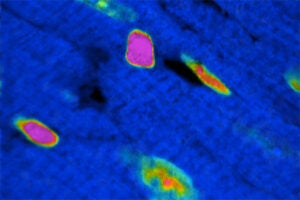
-
Nation & World
Corporation member steps down
Patricia A. King, the Carmack Waterhouse Professor of Law, Medicine, Ethics, and Public Policy at Georgetown Law Center, plans to step down from the Harvard Corporation at the end of December, the University announced today.

-
Nation & World
Tipping science on its head
Scientist and Princeton University President Shirley Tilghman argued for a new approach to teaching science to college students, introducing it earlier in the learning process.
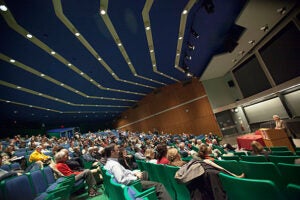
-
Nation & World
New way to model human disease
Researchers at the Wyss Institute for Biologically Inspired Engineering at Harvard University have mimicked pulmonary edema in a microchip lined by living human cells. They used this “lung-on-a-chip” to study drug toxicity and identify potential new therapies to prevent this life-threatening condition.
-
Nation & World
So doggone complicated
Geneticist Elaine Ostrander runs a comparative-genomics lab that examines dog DNA to understand better the traits that might aid understanding of human diseases.
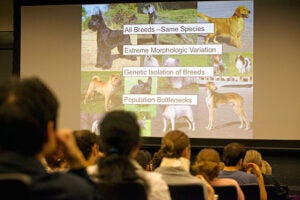
-
Nation & World
Aspirin’s impact on colorectal cancer
Harvard researchers at Dana-Farber Cancer Institute find that aspirin therapy can extend the life of colorectal cancer patients whose tumors carry a mutation in a key gene, but it has no effect on patients who lack the mutation.
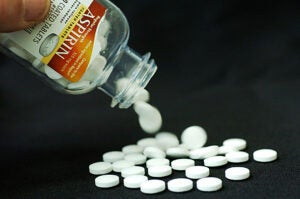
-
Nation & World
Link found between ALS and SMA
Scientists have long known the main proteins that lead to the development of amyotrophic lateral sclerosis (ALS) and spinal muscular atrophy (SMA), respectively. Now research shows that these two motor neuron diseases likely share a pathway that leads to the development of disease.
